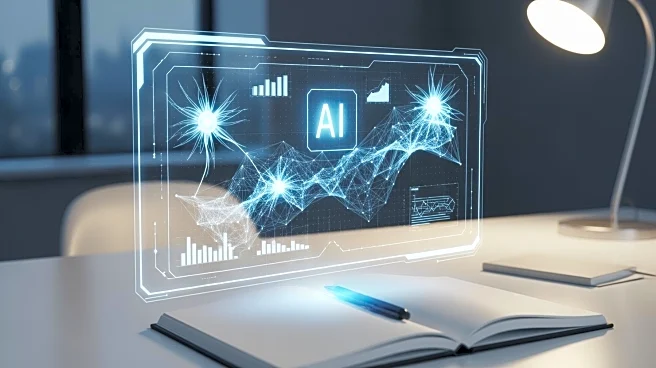What's Happening?
The use of artificial intelligence (AI) is increasingly prevalent in both educational and corporate settings, transforming traditional practices. In high schools, students are utilizing AI tools to assist with assignments, mirroring the methods employed
by professionals in corporate environments. This trend is exemplified by the use of AI to draft and summarize complex documents, such as S-1 filings, which are now largely automated according to Goldman Sachs CEO David Solomon. The integration of AI in education has led to the development of a 'shadow network' where students share resources and utilize AI to optimize their learning processes. This shift has sparked debates about the erosion of critical thinking and originality, as both educators and corporate leaders express concerns over maintaining authenticity in work produced with AI assistance.
Why It's Important?
The growing reliance on AI in education and the workplace signifies a major shift in how tasks are approached and completed. For students, this means a departure from traditional learning methods, potentially impacting their development of critical thinking skills and personal voice. In the corporate world, the automation of tasks previously handled by professionals could lead to increased efficiency but also raises questions about the future of human roles in these environments. The blending of AI into everyday tasks challenges existing norms and prompts a reevaluation of what constitutes authentic work. As AI continues to evolve, stakeholders in education and business must navigate the balance between leveraging technology for productivity and preserving the human elements of creativity and originality.
What's Next?
As AI becomes more integrated into educational and professional settings, institutions may need to adapt their policies and practices to address the ethical and practical implications of this technology. Educators might develop new strategies to ensure students retain critical thinking skills, while businesses could explore ways to maintain a genuine managerial voice despite increased automation. The ongoing evolution of AI technology will likely prompt further discussions on its role in society, potentially leading to new regulations or guidelines to manage its impact. Stakeholders will need to consider how to harness AI's benefits while mitigating its potential drawbacks, ensuring that both educational and corporate environments remain conducive to human development and innovation.
Beyond the Headlines
The widespread use of AI in education and the workplace could lead to long-term cultural shifts, as the line between human and machine-generated work becomes increasingly blurred. This evolution may influence societal perceptions of creativity and originality, challenging traditional notions of intellectual property and authorship. Additionally, the ethical considerations surrounding AI's role in decision-making processes could prompt broader discussions on accountability and transparency. As AI continues to shape various aspects of life, it may redefine the skills and competencies valued in both educational and professional contexts, potentially altering career paths and educational curricula.















